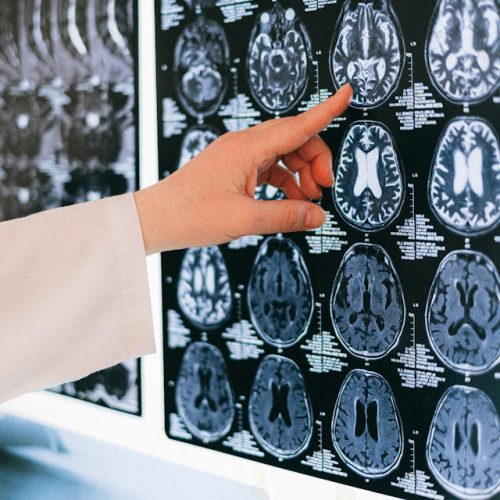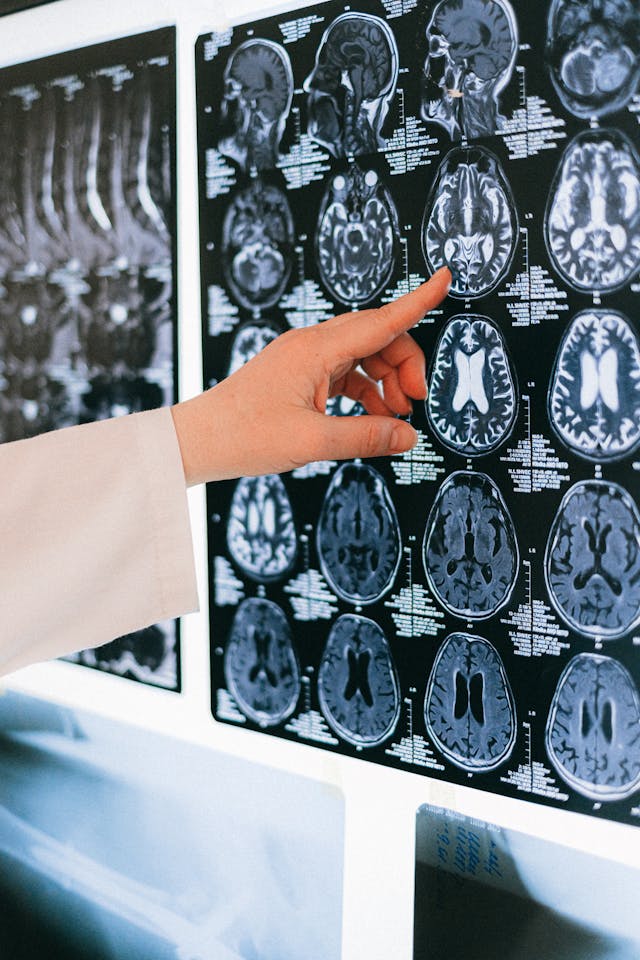What is Stomach & Gut Health?
The stomach is a muscular organ located in the upper abdomen, playing a crucial role in the digestive system. Its primary function is to break down food through mechanical movements and the secretion of gastric juices, which contain enzymes and hydrochloric acid.
This process converts food into a semi-liquid form called chyme, facilitating nutrient absorption in the intestines. The stomach’s role is vital for digestion, nutrient absorption, and overall health. It’s also involved in the production of serotonin which often gets overlooked medically.
Gut Health and Depression
Recent research has highlighted the significant connection between gut health and mental health, particularly depression. The gut-brain axis, a bidirectional communication system between the gut and the brain, plays a crucial role in maintaining both physical and mental well-being. Key points of this connection include:
- Gut Microbiota: The trillions of bacteria and microorganisms in the gut influence brain function through the production of neurotransmitters like serotonin, which regulates mood.
- Serotonin Production: About 90% of the body’s serotonin is produced in the gut. This neurotransmitter is essential for mood regulation, and its imbalance is linked to depression.
- Inflammation: Poor gut health can lead to chronic inflammation, which is associated with the development of depression and other mental health disorders.
- Nutrient Absorption: A healthy gut ensures the proper absorption of nutrients essential for brain health, such as omega-3 fatty acids, vitamins, and minerals.
- Stress Response: The gut microbiota can affect the body’s stress response, influencing cortisol levels and overall stress management.
What is Serotonin?
Serotonin is a neurotransmitter, a type of chemical messenger that helps transmit signals in the brain and throughout the body. Derived from the amino acid tryptophan, serotonin is predominantly found in the gastrointestinal (GI) tract, blood platelets, and the central nervous system (CNS). It plays a crucial role in various physiological processes, including:
- Mood Regulation: Often referred to as the “feel-good” neurotransmitter, serotonin significantly contributes to maintaining mood balance. Low levels of serotonin are linked to mood disorders such as depression and anxiety.
- Sleep: Serotonin influences sleep patterns by helping regulate the sleep-wake cycle.
- Appetite and Digestion: It helps control appetite, affects digestion, and regulates bowel movements.
- Blood Clotting: Serotonin is released by blood platelets to aid in blood clotting.
- Bone Health: It plays a role in bone density and overall bone health.
How Serotonin Relates to Mental Health
Serotonin’s influence on mood and mental health is profound, with imbalances in serotonin levels being associated with several mental health conditions:
Depression
- Low Serotonin Levels: One of the key hypotheses in depression research is that low levels of serotonin in the brain are linked to depressive symptoms.
- Antidepressants: Many antidepressant medications, such as selective serotonin reuptake inhibitors (SSRIs), work by increasing serotonin levels in the brain, thereby improving mood and alleviating symptoms of depression.
Anxiety
- Regulation of Anxiety: Serotonin helps regulate anxiety and mood. Low levels of serotonin can lead to increased anxiety and panic attacks.
- Treatment: SSRIs are often used to treat anxiety disorders by enhancing serotonin levels in the brain.
Sleep Disorders
- Sleep Regulation: Serotonin is a precursor to melatonin, a hormone that regulates sleep. Imbalances in serotonin can disrupt sleep patterns, leading to conditions such as insomnia. This is why it’s believed that many people with depression also suffer from insomnia.
- Sleep Quality: Proper levels of serotonin contribute to better sleep quality and a more regular sleep cycle.
Stress Response
- Stress and Serotonin: Chronic stress can deplete serotonin levels, contributing to mood disorders. Conversely, adequate serotonin levels help in managing stress effectively.
Signs of Dysfunction
When the stomach is not functioning properly, several signs and symptoms may arise, indicating potential issues:
- Indigestion: A feeling of discomfort or pain in the upper abdomen.
- Bloating: Excess gas leading to a swollen and tight abdomen.
- Nausea and Vomiting: Frequent feelings of sickness and expulsion of stomach contents.
- Acid Reflux: A burning sensation in the chest due to stomach acid moving up the esophagus.
- Abdominal Pain: Persistent or recurring pain in the stomach area.
- Loss of Appetite: A reduced desire to eat, often leading to weight loss.
- Fatigue: General tiredness and lack of energy, potentially linked to poor nutrient absorption.
Causes of Stomach Dysfunction
Stomach dysfunction can be caused by a variety of factors, including:
- Dietary Habits: Consumption of fatty, spicy, or acidic foods can irritate the stomach lining.
- Stress: High levels of stress and anxiety can affect stomach function and exacerbate symptoms.
- Infections: Bacterial infections such as Helicobacter pylori can lead to ulcers and other stomach issues.
- Medications: Long-term use of nonsteroidal anti-inflammatory drugs (NSAIDs) can damage the stomach lining.
- Chronic Conditions: Conditions like irritable bowel syndrome (IBS) and gastroesophageal reflux disease (GERD) can impact stomach health.
Diagnosis of Stomach Dysfunction
Diagnosing stomach dysfunction involves several steps:
- Medical History: A detailed discussion of symptoms, dietary habits, and stress levels.
- Physical Examination: Checking for tenderness and other physical signs.
- Laboratory Tests: Blood tests to check for infections or nutrient deficiencies.
- Imaging Tests: Ultrasound, CT scans, or X-rays to visualize the stomach and surrounding organs.
- Endoscopy: Inserting a thin, flexible tube with a camera to examine the stomach lining and take biopsies if necessary.
Treatment Options
Treating stomach dysfunction involves various methods, depending on the underlying cause:
Dietary Changes
Adopting a balanced diet is fundamental in managing stomach dysfunction. Key strategies include:
- Smaller, Frequent Meals: Eating smaller meals more frequently can help reduce the burden on the stomach, improve digestion, and prevent symptoms such as bloating and indigestion. This approach helps maintain stable blood sugar levels and prevents overeating.
- Avoiding Trigger Foods: Certain foods can exacerbate stomach issues. Common trigger foods include spicy foods, fatty foods, acidic foods (like citrus fruits and tomatoes), caffeine, and alcohol. Identifying and eliminating these from the diet can significantly reduce symptoms.
- Incorporating Fiber: A diet rich in fiber from fruits, vegetables, and whole grains promotes healthy digestion and prevents constipation. However, it’s important to gradually increase fiber intake to avoid gas and bloating.
Medications
Various medications can be prescribed to manage stomach dysfunction, depending on the specific condition:
- Antacids: These medications neutralize stomach acid, providing quick relief from heartburn and indigestion. They are often used for occasional symptoms.
- Proton Pump Inhibitors (PPIs): PPIs, such as omeprazole and lansoprazole, reduce the production of stomach acid, providing longer-lasting relief from acid reflux and allowing the stomach lining to heal.
- Antibiotics: For bacterial infections like Helicobacter pylori, antibiotics are essential to eradicate the infection and prevent complications such as ulcers. Treatment typically involves a combination of antibiotics and a PPI.
Stress Management
Stress has a significant impact on stomach health, and managing stress is crucial in treating stomach dysfunction. Effective stress management techniques include:
- Mindfulness: Practices such as meditation and deep breathing exercises help reduce stress and promote relaxation, which can alleviate symptoms.
- Yoga: Yoga combines physical postures, breathing exercises, and meditation to reduce stress and improve overall well-being. Specific yoga poses can aid digestion and reduce bloating.
- Counseling: Therapy or counseling can help address underlying stressors and provide coping strategies. Cognitive-behavioral therapy (CBT) is particularly effective in managing stress and anxiety-related stomach issues.
Probiotics
Probiotics are supplements containing beneficial bacteria that can improve gut flora and digestive health. Key points about probiotics include:
- Restoring Balance: Probiotics help restore the balance of good bacteria in the gut, which can be disrupted by factors like antibiotic use, poor diet, and stress.
- Improving Digestion: They can enhance digestion and nutrient absorption, reduce bloating and gas, and alleviate symptoms of irritable bowel syndrome (IBS).
- Strengthening Immunity: Probiotics also support the immune system and help protect against gastrointestinal infections.
Surgery
In severe cases of stomach dysfunction, surgical intervention may be necessary to correct structural issues or remove damaged tissue. Types of surgical treatments include:
- Fundoplication: This surgery is used to treat GERD (gastroesophageal reflux disease) by wrapping the top part of the stomach around the lower esophagus to strengthen the sphincter and prevent acid reflux.
- Gastrectomy: Partial or total removal of the stomach may be required for conditions like stomach cancer or severe ulcers. The remaining part of the stomach or esophagus is then attached to the small intestine.
- Bariatric Surgery: For obesity-related stomach issues, procedures such as gastric bypass or sleeve gastrectomy can promote weight loss and improve related conditions like acid reflux and diabetes.
Prevention of Stomach Dysfunction
Preventing stomach dysfunction involves lifestyle changes and mindful practices:
- Healthy Diet: Eating a balanced diet rich in fiber, fruits, and vegetables.
- Hydration: Drinking plenty of water to aid digestion.
- Regular Exercise: Engaging in physical activity to promote overall health.
- Stress Reduction: Practicing stress management techniques regularly.
- Avoiding NSAIDs: Limiting the use of nonsteroidal anti-inflammatory drugs and seeking alternatives.
Talking to Your Doctor
If you are experiencing stomach issues and have concerns about how they may relate to your depression, it’s important to speak with your doctor. Here are some tips on how to discuss your symptoms:
- Be Honest: Clearly describe your symptoms, including their frequency and severity.
- Share Your History: Provide information about your dietary habits, stress levels, and any medications you’re taking.
- Ask Questions: Inquire about potential links between your stomach issues and depression.
- Follow Up: Discuss treatment options and follow through with recommended tests or lifestyle changes.
Disclaimer
This article is for educational purposes based on my research. I am not a doctor nor a health advisor. None of the information in this article should be considered without consulting your primary care doctor first.








